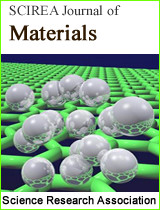Influence of duty cycle on biocompatibility of nanostructured tantalum film deposited by pulsed DC PACVD
DOI: 428 Downloads 17718 Views
Author(s)
Abstract
Nanostructured Tantalum (Ta) thin films were deposited by plasma assisted chemical vapor deposition (PACVD) at duty cycles of 17%, 25%, and 33%. FESEM and MTT assay indicated that the Ta film deposited at duty cycle of 25% provides the best surface biocompatibility because of its flawless and uniform structure. Furthermore, Rockwell adhesion test indicated that the best film adhesion observed in Ta film that deposited at duty cycle of 25% and this attributed to its dominant α-phase structure.
Keywords
Keywords: Nanostructure; Tantalum; PACVD; Biocompatibility
Cite this paper
H. Ghorbani, A. Abdollah-zadeh, A. Poladi,
Influence of duty cycle on biocompatibility of nanostructured tantalum film deposited by pulsed DC PACVD
, SCIREA Journal of Materials.
Volume 1, Issue 1, October 2016 | PP. 31-36.
References
| [ 1 ] | S.S.M. Tavares, F.B. Mainier, F. Zimmerman, R. Freitas, C.M.I. Ajus, Characterization of prematurely failed stainless steel orthopedic implants, Eng. Fail. Anal. 17 (2010) 1246–1253. |
| [ 2 ] | S.A. Omar, J. Ballarre, S.M. Cer??, Protection and functionalization of AISI 316L stainless steel for orthopedic implants: Hybrid coating and sol gel glasses by spray to promote bioactivity, Electrochim. Acta. (2015). |
| [ 3 ] | Y.S. Hedberg, I. Odnevall Wallinder, Metal release from stainless steel in biological environments: A review, Biointerphases. 11 (2016) 018901. |
| [ 4 ] | E. Silva, L. Oliviera, Chemical and metallographic characterization of stainless steel in implants removed from patients, Acta Ortop Bras. 19 (2011) 280–285. |
| [ 5 ] | A. De Mel, B.G. Cousins, A.M. Seifalian, Surface modification of biomaterials: A quest for blood compatibility, Int. J. Biomater. 2012 (2012). |
| [ 6 ] | Y.X. Leng, J.Y. Chen, P. Yang, H. Sun, J. Wang, N. Huang, The biocompatibility of the tantalum and tantalum oxide films synthesized by pulse metal vacuum arc source deposition, Nucl. Instruments Methods Phys. Res. Sect. B Beam Interact. with Mater. Atoms. 242 (2006) 30–32. |
| [ 7 ] | W.D. Westwood, N. Waterhouse, P.S. Wilcox, Tantalum thin films, J. Vac. Sci. Technol. 13 (1976) 651–660. |
| [ 8 ] | L. Hallmann, P. Ulmer, Effect of sputtering parameters and substrate composition on the structure of tantalum thin films, Appl. Surf. Sci. 282 (2013) 1–6. |
| [ 9 ] | V.A. Luzanov, A.S. Vedeneev, V. V. Ryl’kov, M.P. Temiryazeva, A.M. Kozlov, M.P. Dukhnovskii, A.S. Bugaev, Synthesis of thin tantalum films by magnetron sputtering, J. Commun. Technol. Electron. 60 (2015) 1325–1327. |
| [ 10 ] | K. Valleti, A. Subrahmanyam, S. V. Joshi, Growth of nano crystalline near α phase tantalum thin films at room temperature using cylindrical magnetron cathode, Surf. Coatings Technol. 202 (2008) 3325–3331. |
| [ 11 ] | Y. Suh, W. Chen, S. Maeng, S. Gu, R.A. Levy, H. Thridandam, Synthesis and characterization of plasma assisted chemically vapor deposited tantalum, Thin Solid Films. 518 (2010) 5452–5456. |

